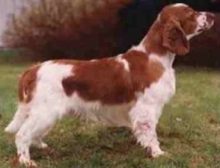Welsh Springer Spaniel
Lifestyle Needs

The Welsh Springer Spaniel is a working dog whose job is to ‘spring’ game so that the birds can be shot by the hunters. He is a somewhat smaller and lighter dog than the English Springer with a dark red coat on a white background. More recently the Welsh Springer has drifted away from his working life and become a family dog. It should be remembered that he is an intelligent, energetic working dog who needs to have his energies channelled in the right direction. He will need to live in a house with a garden and have access to the open countryside. Ideally he should have around two hours exercise every day. His fine, medium length, glossy coat will need grooming regularly to keep it in good condition and free from debris.
Genetic Diversity
(Known as Coefficient of Inbreeding: 'COI'. It should be as low as possible.)
The UK Kennel Club breed average COI is 12.4% - See 'A Beginners Guide to COI'
Gene Pool Size
(Known as Effective Population Size: 'EPS')
36.45
EPS is a measure of how many individuals are contributing genetically to a breed population. It is a measure of the size of the gene pool in a breed. Lower than 100 is considered critical by conservationists and below 50 brings a breed close to extinction. For more information see the Kennel Club article.
Health and Welfare Problems due to Conformation
(Body shape and physical characteristics)
- The Welsh Springer’s longish ears can harbour a build up of wax and can be liable to ear infection if not regularly checked and cleaned.
BVA/KC Health Schemes: www.bva.co.uk/chs
- Hip dysplasia: breed 5 year mean score 16.7 (parents should be lower)
- Elbow dysplasia: should be as low as possible
- Eye disease: Goniodysgenesis/Primary glaucoma (annual testing); Hereditary cataract (HC) (annual testing)
Estimated Breeding Values (EBVs) : EBVs for Hip Dysplasia are available for this breed
www.thekennelclub.org.uk/about-ebvs
DNA Tests Available
DogWellNet and IPFD Harmonisation of Genetic Testing for Dogs (HGTD)
www.dogwellnet.com/breeds
None known
Availability of a DNA test does not mean that it is always necessary or even desirable for breeders to use this test.
Other Breed-Specific Health Screening Schemes
Welsh Springer Spaniel clubs have formed a Joint Health Group:
www.wssc.fsnet.co.uk/jhghome.htm
Ask the breeder to show you the certificates for the above tests/screening for both parents. If any of the above tests have not been considered necessary by the breeder (and there may be good reasons), ask her to explain why.
Other Diseases Reported
(For which there are currently no genetic or screening tests for sire or dam)
- Atopic dermatitis
- Ear infections
- Epilepsy
Ask the breeder about the medical history of the parents, grandparents and great grandparents. Consider carefully whether to purchase a puppy if some of these or other diseases are in the family line.
Ask about the breeder’s policy in cases of serious genetic diseases occurring to your puppy in later life. Good breeders will request to be informed of such events in order to improve future breeding decisions.
You are strongly advised to buy from a breeder who uses (or is prepared to use) the AWF Puppy Contract and Puppy Information Pack (PIP): www.puppycontract.org.uk
The breeder should also be familiar with the CFSG/DBRG Code of Practice for Dog Breeding